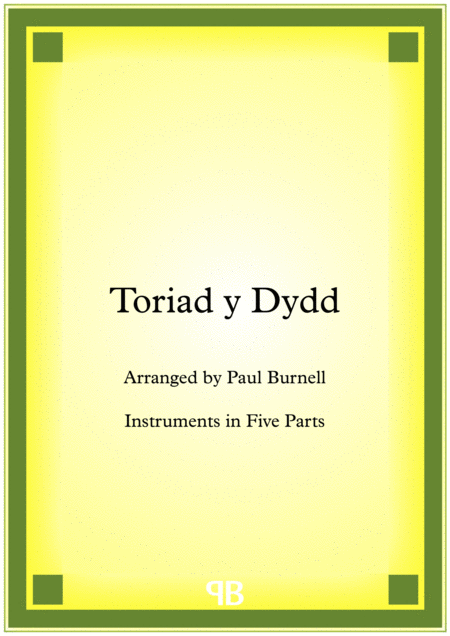String Ensemble,String Quintet - Level 3 - Digital Download SKU: A0.835813 Composed by Traditional. Arranged by Paul Burnell. Contemporary,Folk. Score and parts. 41 pages. Paul Burnell #3692737. Published by Paul Burnell (A0.835813). Toriad y Dydd, traditional Welsh tune arranged for instruments in five parts by Paul Burnell October 2018. Duration c.5:00The arrangement is suitable for multiple quintet combinations with parts available (and potential instrumentations suggested) as follows:Part 1: C, Eb (flute, soprano recorder, Eb clarinet, violin 1)Part 2: C, Bb (flute, oboe, alto recorder, Bbclarinet, violin 2)Part 3: C, Bb (Bb clarinet, tenor recorder, violin 3, viola)Part 4: C - alto & bass clefs, Bb, Eb, F (Bb clarinet, bass recorder, alto saxophone, horn in F, viola) Part 5: C - bass clef, Bb, F (bassoon, great bass recorder, tenor saxophone, horn in F, 'cello)Part 5 may be played an octave lower than written.Any other appropriate instruments, even if not suggested above, may play.Although the score is presented with layout appropriate for strings this does not indicate a preferred instrumentation. Programme note:'Toriad y Dydd', also known as 'Break of Day', is a traditional Welsh tune. Joseph Haydn arranged the tune for soprano and piano trio for a collection of Welsh songs around 1803-1804. The song became better known when it was included in the collection 'The Songs of Wales' published by Boosey and Hawkes in 1873. When sung, the song title is given variously as 'Torriad y Dydd' (spelt with a double 'r'), 'The Dawn of Day', 'Taliesin's Prophecy' and 'Golwg Ar dy Gyfaill'.
